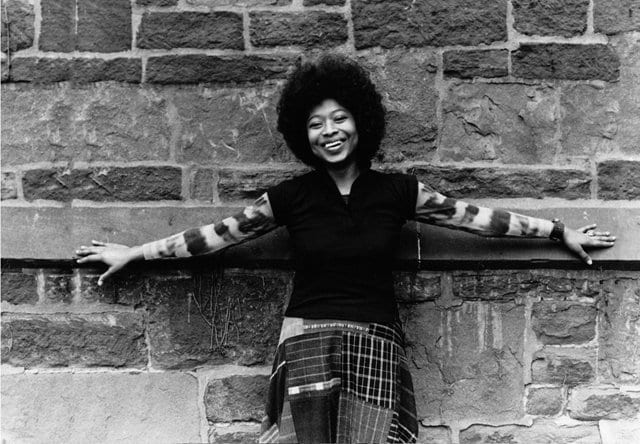
Alice Walker Credit: flickr - codepinkalert
Outspoken author Alice Walker once said, “Activism is the rent I pay for living on the planet.” Walker is known to many as the woman behind the wildly successful, groundbreaking, Pulitzer Prize-winning novel The Color Purple. Her rich literary career and advocacy work have always been fuelled by her deep desire to deconstruct society’s most complex conflicts – class, race, sexuality and gender – and examine the way they have affected the psychology of the African American community for generations. In the new documentary Alice Walker: Beauty in Truth, award-winning director Pratibha Parmar lovingly explores the life of a woman consumed by the beauty of language and its ability to effect social change regardless of the dark places it takes her.
The youngest of eight children, Walker grew up in small-town Georgia. She began writing poetry as a means to express herself and understand her world in the face of the crushing poverty and rampant racism in the Southern US during the Jim Crow era.
With an ingrained passion for equality politics, a brash young Walker stayed primarily in the South to immerse herself in desegregation activism before moving to New York City to renew her interest in writing. There she would write her first published collections and work as a contributing editor of Ms magazine alongside feminist icon Gloria Steinem. She helped open doors for many female African American writers looking for a place to express themselves.
Walker’s 10th book, The Color Purple, inspired by the oral traditions of her grandparents, was published in 1984. The film adaptation was directed by Steven Spielberg and starred Oprah Winfrey, Whoopi Goldberg and Danny Glover. The musical debuted in 2005 and was nominated for 11 Tony Awards. One of this documentary’s most dynamic sections deals with the controversy the book and film caused because of their depiction of homosexuality, violence and sexism within an African American narrative. From passionate town halls decrying the work to protests in the street, Walker became a lightning rod for a community cautious of self-critique or any positive association with the gay community.
According to the documentary, the torrid and tender love affair between Celie and Shug in The Color Purple made it the first major novel to depict love between two women as a natural and beautiful thing. “I’m not a lesbian, I’m not bisexual, I’m not straight, I’m curious,” Walker states. “If you’re really alive, how can you be in one place the whole time? That doesn’t work for me.” The film covers her romantic relationships – from her first marriage, to Jewish civil rights lawyer Melvyn Rosenman Leventhal, that led to constant harassment from the KKK, to her very public relationship with iconic songstress Tracy Chapman – painting the portrait of a woman whose craft is as passionate and undefinable as her sexuality.
From her early days on the front lines of civil rights battles in the South, to her crusade against female circumcision in Africa, and more recently highlighting the humanitarian struggles in Rwanda, the Congo and Palestine, Walker has spent her life fighting for people’s right to experience the beauty of a life lived outside the shadows of oppression. In exploring what has made Walker the wise woman she is today, Parmar has created an inspiring tale of a resilient woman who refuses to be categorized, and every community she has touched is better for it.

 Why you can trust Xtra
Why you can trust Xtra


